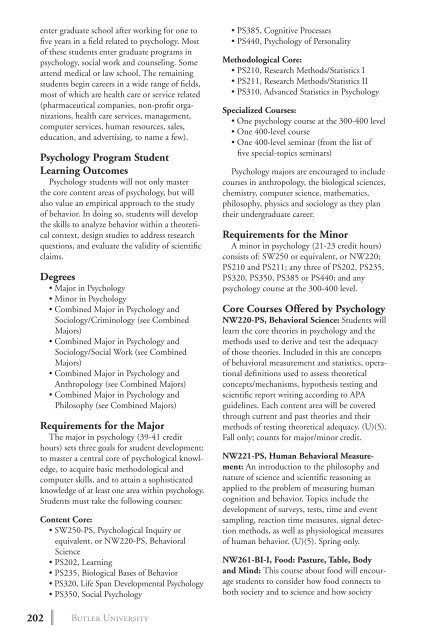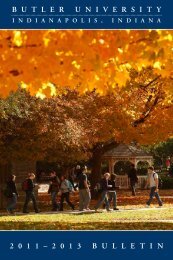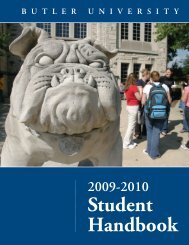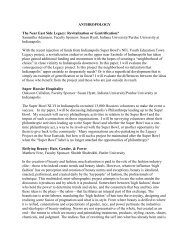The College of Liberal Arts and Sciences - Butler University
The College of Liberal Arts and Sciences - Butler University
The College of Liberal Arts and Sciences - Butler University
Create successful ePaper yourself
Turn your PDF publications into a flip-book with our unique Google optimized e-Paper software.
enter graduate school after working for one to<br />
five years in a field related to psychology. Most<br />
<strong>of</strong> these students enter graduate programs in<br />
psychology, social work <strong>and</strong> counseling. Some<br />
attend medical or law school. <strong>The</strong> remaining<br />
students begin careers in a wide range <strong>of</strong> fields,<br />
most <strong>of</strong> which are health care or service related<br />
(pharmaceutical companies, non-pr<strong>of</strong>it organizations,<br />
health care services, management,<br />
computer services, human resources, sales,<br />
education, <strong>and</strong> advertising, to name a few).<br />
Psychology Program Student<br />
Learning Outcomes<br />
Psychology students will not only master<br />
the core content areas <strong>of</strong> psychology, but will<br />
also value an empirical approach to the study<br />
<strong>of</strong> behavior. In doing so, students will develop<br />
the skills to analyze behavior within a theoretical<br />
context, design studies to address research<br />
questions, <strong>and</strong> evaluate the validity <strong>of</strong> scientific<br />
claims.<br />
Degrees<br />
• Major in Psychology<br />
• Minor in Psychology<br />
• Combined Major in Psychology <strong>and</strong><br />
Sociology/Criminology (see Combined<br />
Majors)<br />
• Combined Major in Psychology <strong>and</strong><br />
Sociology/Social Work (see Combined<br />
Majors)<br />
• Combined Major in Psychology <strong>and</strong><br />
Anthropology (see Combined Majors)<br />
• Combined Major in Psychology <strong>and</strong><br />
Philosophy (see Combined Majors)<br />
Requirements for the Major<br />
<strong>The</strong> major in psychology (39-41 credit<br />
hours) sets three goals for student development:<br />
to master a central core <strong>of</strong> psychological knowledge,<br />
to acquire basic methodological <strong>and</strong><br />
computer skills, <strong>and</strong> to attain a sophisticated<br />
knowledge <strong>of</strong> at least one area within psychology.<br />
Students must take the following courses:<br />
Content Core:<br />
• SW250-PS, Psychological Inquiry or<br />
equivalent, or NW220-PS, Behavioral<br />
Science<br />
• PS202, Learning<br />
• PS235, Biological Bases <strong>of</strong> Behavior<br />
• PS320, Life Span Developmental Psychology<br />
• PS350, Social Psychology<br />
• PS385, Cognitive Processes<br />
• PS440, Psychology <strong>of</strong> Personality<br />
Methodological Core:<br />
• PS210, Research Methods/Statistics I<br />
• PS211, Research Methods/Statistics II<br />
• PS310, Advanced Statistics in Psychology<br />
Specialized Courses:<br />
• One psychology course at the 300-400 level<br />
• One 400-level course<br />
• One 400-level seminar (from the list <strong>of</strong><br />
five special-topics seminars)<br />
Psychology majors are encouraged to include<br />
courses in anthropology, the biological sciences,<br />
chemistry, computer science, mathematics,<br />
philosophy, physics <strong>and</strong> sociology as they plan<br />
their undergraduate career.<br />
Requirements for the Minor<br />
A minor in psychology (21-23 credit hours)<br />
consists <strong>of</strong>: SW250 or equivalent, or NW220;<br />
PS210 <strong>and</strong> PS211; any three <strong>of</strong> PS202, PS235,<br />
PS320, PS350, PS385 or PS440; <strong>and</strong> any<br />
psychology course at the 300-400 level.<br />
Core Courses Offered by Psychology<br />
NW220-PS, Behavioral Science: Students will<br />
learn the core theories in psychology <strong>and</strong> the<br />
methods used to derive <strong>and</strong> test the adequacy<br />
<strong>of</strong> those theories. Included in this are concepts<br />
<strong>of</strong> behavioral measurement <strong>and</strong> statistics, operational<br />
definitions used to assess theoretical<br />
concepts/mechanisms, hypothesis testing <strong>and</strong><br />
scientific report writing according to APA<br />
guidelines. Each content area will be covered<br />
through current <strong>and</strong> past theories <strong>and</strong> their<br />
methods <strong>of</strong> testing theoretical adequacy. (U)(5).<br />
Fall only; counts for major/minor credit.<br />
NW221-PS, Human Behavioral Measurement:<br />
An introduction to the philosophy <strong>and</strong><br />
nature <strong>of</strong> science <strong>and</strong> scientific reasoning as<br />
applied to the problem <strong>of</strong> measuring human<br />
cognition <strong>and</strong> behavior. Topics include the<br />
development <strong>of</strong> surveys, tests, time <strong>and</strong> event<br />
sampling, reaction time measures, signal detection<br />
methods, as well as physiological measures<br />
<strong>of</strong> human behavior. (U)(5). Spring only.<br />
NW261-BI-I, Food: Pasture, Table, Body<br />
<strong>and</strong> Mind: This course about food will encourage<br />
students to consider how food connects to<br />
both society <strong>and</strong> to science <strong>and</strong> how society<br />
202<br />
<strong>Butler</strong> <strong>University</strong>
















